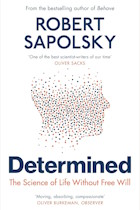Determined - The Science of Life without Free Will
Where does your aversion to things, animals, or even certain people come from? Why do you behave in a particular way and avoid behaving in another? Are you responsible for all your actions and the choices you make? Or is it all biology?
This is the main topic of this book Determined – Is there free will? And if there is NO free will, are we just machines driven by our physiology? And if we believe there is no free will and it is also determined, will there be fewer acts of kindness, will we feel less appreciated and not credited for our efforts, or do we need to think beyond?
It is such an abstract, controversial, and difficult topic, and the author has done an amazing job discussing it.
His earlier book Behave - The Biology of Humans at Our Best and Worst was very detailed, quoting multiple studies and research papers. There was a lot of neuroscience as well, and a lot of it made sense, but many parts were difficult to understand.
This book, is a continuation and is very thought-provoking.
The first half of the book is a recap of Behave - The Biology of Humans at Our Best and Worst – how one second, one minute, one hour, the days, months, your adolescence, your childhood, your fetal stage, your conception**, the culture you are growing up in, the economic state you are born into, and your upbringing can all automatically cause you to react in a particular way—without you actually choosing it.
He also introduces concepts of computational randomness and quantum indeterminacy, that are commonly used to support the concept of choice and free will. These were very interesting and many parts were new, but honestly I think I didn’t understand them completely.
Here is what I took from it:
Computational randomness means that even if a computer (or brain) is following logical rules, the outcome can still be unpredictable—because small changes in the input can cause big changes in the output. It’s not exactly “random” like flipping a coin, but it’s so complex that it seems random.
Quantum indeterminacy is the idea from physics that, at the smallest level (like atoms or particles), some events don’t have a predictable cause—they just happen. Even if you know everything about a particle, you can’t say for sure what it will do next. This randomness may or may not affect how the brain works, but it’s often brought up when discussing whether our actions are fully determined.
The author argues that this randomness doesn’t grant us free will.
The second part of the book is more about how we as individuals react to “determined” behavior, whether it’s our own or someone else’s.
Does not sticking to your diet or skipping the gym make you feel like a loser? Does not completing a course or dropping out when things get tougher make you a quitter? Think again about what happened that day, that month, in your adolescence, and about everything around you. Do you have it more difficult to follow through because your brain is wired differently? What works for some may or may not work for you. It doesn’t mean you’re doing it wrong or being lazy. You determined to behave differently.
What about the behavior of criminals? Are their actions a consequence of something they had no control over? The author provides excellent examples that keep you thinking. He also discusses how society should respond to such behaviors if they’re determined by biology and past experiences—how should justice and morality adapt.
He suggests that if our actions are predetermined, traditional notions of blame and punishment may need reevaluation. He advocates for a justice system focused on rehabilitation and societal protection rather than retribution.
I am not fully convinced that there is no free will—or maybe I don’t want to believe it fully. I want to believe that we have some amount of control, especially when we choose to change things around us. When we move away from a place, relationship, or job, we are enabling ourselves to rewire the brain in a new way. But am I thinking this way because I am conditioned to think like this — was that Determined?
Whether or not you’re convinced by the end, it will definitely get you thinking. Excellent book and a must-read!
© 2026 Sindhuja Cheema Enzinger. All Rights Reserved.

